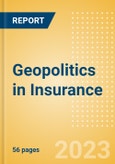The occurrence of civil unrest is growing across the world as consumer finances are continually squeezed due to the global cost-of-living crisis. Political risk and political violence are becoming prevalent threats to businesses across the world and therefore are becoming key risks to insurers. Military tensions are growing around Taiwan (a province of China) and the South China Sea. Businesses operating in or around China could be subject to similar measures as those in Russia following its invasion of Ukraine, leading to various knock-on effects for trade-related insurance policies. The cyber risks posed by military activity are also a major systemic risk to the industry. As companies engage in reshoring or friendshoring away from China, supply chains will be affected by the changes. Costs will almost certainly go up as operations are moved away from low-cost labor locations, thus increasing claims costs for the industry. Meanwhile, geopolitical tensions around major shipping passages will likely put increased pressure on marine, aviation, and transit lines.
Scope
- Russia's invasion of Ukraine will be highly costly to insurers. Estimates suggest losses could be as high as $20 billion for the industry.
- The past few years have seen considerable damage caused by political violence. For example, Allianz Global Corporate and Specialty cites $1.3 billion in losses caused by damage to infrastructure and lost output in Peru during protests in 2022.
- The effects and costs of climate change are tangible. Swiss Re estimates that 2022 saw $115 billion in insured losses globally.
Reasons to Buy
- Understand the relationships between the world's current major and upcoming geopolitical powers.
- Determine how political risk and political violence are increasing across the world and how insurers can mitigate against them, providing vital cover for international businesses.
- See how economic, social, and political factors are coalescing into a difficult period across the world.
- Formulate strategies for overcoming these challenges in areas across the insurance value chain.
Table of Contents
- Executive Summary
- Players
- Thematic Briefing
- Trends
- Technology trends
- Macroeconomic trends
- Regulatory trends
- Industry Analysis
- Geopolitics challenges in insurance
- Timeline
- Signals
- Company filing trends
- Social media trends
- Value Chain
- Product development
- Marketing and distribution
- Underwriting and risk profiling
- Claims management
- Customer service
- Companies
- Sector Scorecards
- Non-life insurance sector scorecard
- Glossary
- Further Reading
- Thematic Research Methodology
- About the Publisher
- Contact the Publisher
Companies Mentioned (Partial List)
A selection of companies mentioned in this report includes, but is not limited to:
- AXA
- Allianz
- Liberty Mutual
- Chubb
- Lloyd’s of London
- AIG
- Sompo. Tokio Marine
- WTW
- Aon
- Marsh
- Gallagher
- Howden
- BPL Global
- Lockton
- Tysers
- Munich Re
- Swiss Re
- Hannover Re
- Everest Re
- SCOR
- Arch Re
- China Re
- Renaissance Re
- Credendo
- Zurich








